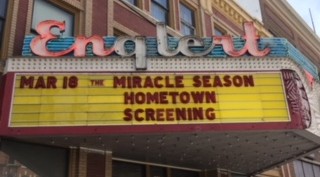“The Miracle Season” Premieres in Iowa City
Susan Harman
Your Prep Sports
Hoopla filled the sidewalk in front of the Englert theater Sunday as “The Miracle Season” movie debuted before a hometown audience.
Reporters interviewed principals on a red carpet in front of the theater, and long lines of people waited to get in to see what Hollywood made of Iowa City’s very own story of tragedy and triumph in 2011.
West High’s 2011 state championship volleyball team was present along with a host of West High teachers, coaches and students, past and present.
Inside the theater former West volleyball coach Kathy Bresnahan, former West principal Jerry Arganbright and Ernie Found all spoke before the movie was shown. Because the film’s general release isn’t until April, the producers prohibited media from publishing reviews after this premiere.
The movie is not a documentary but is based on the story of Caroline Found’s tragic death just before the 2011-12 school year began, its impact on her volleyball team, the school, the community and the Found family.
While the movie takes certain liberties, Bresnahan’s book (also “The Miracle Season”) is a detailed, first-person account of a coach trying to manage a team of 15 grief-stricken young women through the season.
As Bresnahan has said, there’s no coaching manual for this situation. Bresnahan and her assistant Scott Sanders had to figure it all out on their own, every day, and deal with their own grief in the meantime.
It’s a remarkable book from a lot of perspectives. The story itself of the team coming together to win a state championship is incredible enough. The young women are a diverse, likeable bunch trying to deal with an unthinkable tragedy while continuing to function as students and volleyball players.
Clearly it’s a topic, a season, worthy of revisiting.
But this journey wasn’t easy and this book shows why. Bresnahan is completely open about her doubts and fears in trying to figure out the right ways to motivate her players. She wants them to try to focus on volleyball as their sanctuary and yet they can’t get together without thinking of Found.
In Found, West lost its setter, its captain and its heart and soul. It lost a prankster, an instigator, a leader and sometime troublemaker. There was an emptiness that had to be filled somehow.
Bresnahan explores the psyches of different players, trying to figure out who best can fill some of these roles. She has to find a setter, a position she says is the key to a team and one that usually takes years to master. She has just a couple months. It’s fascinating to see how she and Sanders decide Kelly Fliehler will fill the role and what they do to get her to accept it and eventually prosper in it.
Practices are a challenge from the beginning of the season to end, something that’s bound to frustrate a veteran coach. She and Sanders try different things. Some work; some don’t.
The book may be too detailed for some. But she is intent on tracing the progress of this team, physically, mentally and emotionally and many of the details are telling.
What’s impressive in the end is Bresnahan’s willingness to be completely candid about what she’s thinking and feeling on a daily basis as she slogs through this impossible situation. It’s an emotional grind for her as well as for the players, and writing this book can’t have been easy. But she knew this was an extraordinary story and she knew she was in the best position to tell it.
No two coaches are alike but I have to think this is a book that will provide insight to coaches at almost any level. Coaches can empathize with the daily battles won and lost by Bresnahan and Sanders. Across sports and across age groups there are some universal truths to the profession.
But this book has some universal truths well beyond coaching. And that’s why it should appeal to parents, players, sports fans and fans of the human spirit.






